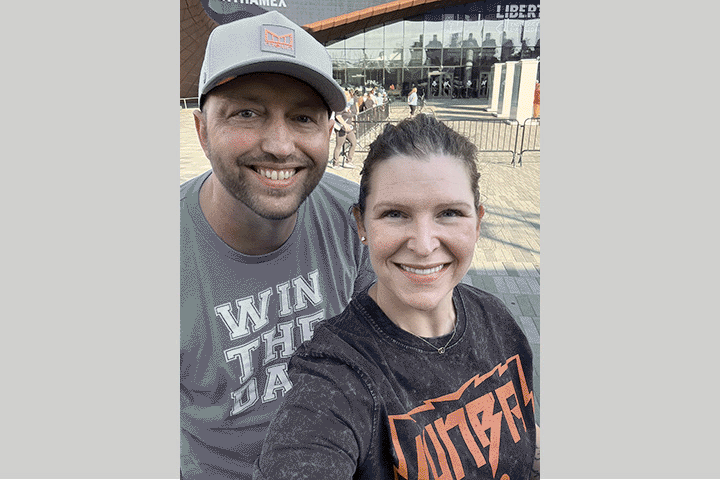PASS-01 Trial Results: Filling the Gaps in Personalized Medicine

Nenad Stojkovic; Wikimedia Commons
The PASS-01 trial, comparing modified FOLFIRINOX (mFFX) and gemcitabine/nab-paclitaxel (GnP) for advanced pancreatic cancer, has posted results.
Both chemotherapy combinations are standard first-line treatment options for advanced pancreatic cancer. But a head-to-head comparison of the two drugs among North American patients had never been studied. Plus, doctors had no identified biomarkers to help choose the right treatment for the right patient.
The goal of the large, multicenter phase II PASS-01 trial was to fill those gaps by using comprehensive molecular profiling and patient-derived organoid (PDO) drug sensitivity testing. The results, published in the September 10, 2025 edition of the Journal of Clinical Oncology, show what can be achieved by pairing therapy response data with comprehensive molecular and genomic profiling of each patient’s tumor.
The PASS-01 trial “is the first time we are getting a look that helps us understand which therapy is best for which patients,” explains Andrew Rakeman, Ph.D., vice president of research for the Lustgarten Foundation. “Apart from pancreatic cancer patients with BRCA mutations, who we know respond better to platinum-based chemotherapies and therefore were not included in this study, we didn’t have good data to determine if one therapy outperformed the other. Or if there were features that can predict which treatment would help an individual patient most.”
Overall, the results show that the clinical outcomes were very similar in the two groups, although the safety and tolerability were better with GnP.
New Insights
By generating genomic, genetic, immune profiling, single-cell analysis, and drug sensitivity data and developing patient-specific organoid models, the team amassed enormous amounts of data in real time and met regularly at Molecular Tumor Board meetings. This collaborative approach allowed the researchers to determine if the two randomized groups responded differently to the two treatments.
- 160 patients were randomized across six leading sites in the U.S. and Canada.
- Progression-free survival was similar between the two groups, but overall survival and safety trends favored GnP.
- Rapid molecular profiling revealed two distinct subtypes of pancreatic cancer—basal-like and classical. Patients with basal-like tumors responded poorly overall, but fared best with GnP.
- Because the profiling was done in real time, 44 percent of patients who moved to a second-line therapy were able to receive treatments guided by the study’s data.
The researchers are beginning to see some data that tumors classified as either “classical” or “basal-like” do indeed respond differently, says Rakeman, adding that the “real time” discussions helped direct second-line treatment choices for some patients.
About the Study
There were 160 patients in the trial. Half were randomly assigned to receive mFFX, and the other 80 were treated with GnP. Of the initial group of patients, 140 were able to complete the trial without major deviations from the protocol: 71 mFFX and 69 GnP, with median follow-up of 8.3 months. The median progression-free survival was 4.0 months for mFFX versus 5.3 months for GnP in that group. Median overall survival was 8.5 months with mFFX and 9.7 months with GnP.
The median progression-free survival for those with basal-like pancreatic cancer was 3.0 months on mFFX and 5.5 months for the GnP group. The median progression-free survival for classical pancreatic cancer was 6.3 months in the mFFX group versus 5.4 months in the GnP cohort. The median overall survival in basal-like was 7.5 months with mFFX and 8.9 months with GnP versus classical overall survival of 9.7 months with mFFX and 13.9 months for the GnP cohort. More than half of patients received second-line treatment, with 44 percent being correlate-guided. The median time on second-line treatment was 2.1 months with a median overall survival of 5.4 months for a correlate-guided choice versus 4.4 months on a standard chemotherapy approach.
The PASS-01 trial has “generated what is likely one of the largest clinical trial data sets in pancreatic cancer,” adds Rakeman. The data collected will help researchers better understand the heterogeneity of pancreatic cancer and response to therapy, both of which are vital for personalized therapies, he explains. “The trial also provides a framework for how to study new treatments in a rapid, data-rich, and science-driven format, providing a path to accelerate the development of new therapies coming down the pike,” he notes.
The PASS-01 study was supported by the Lustgarten Foundation and Stand Up To Cancer through the Pancreatic Cancer Collective, with additional support for organoid research at Cold Spring Harbor Laboratory through the Gail V. Coleman and Kenneth M. Bruntel Organoids for Personalized Therapy Grant.






